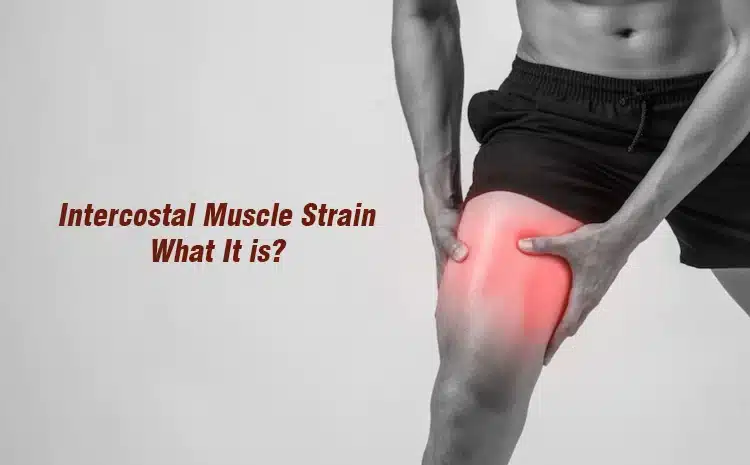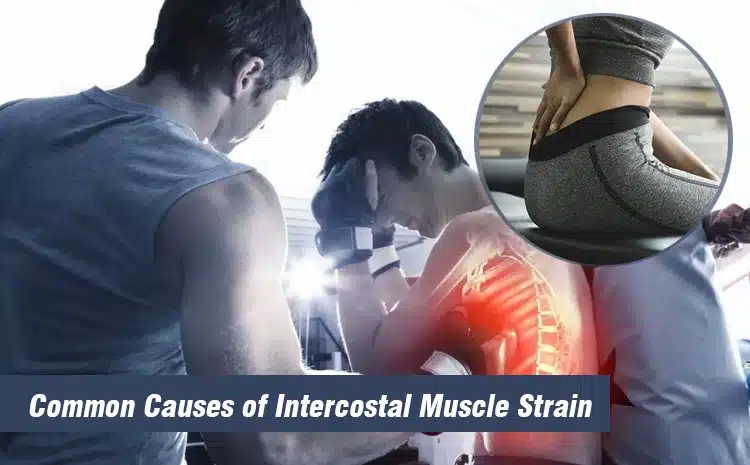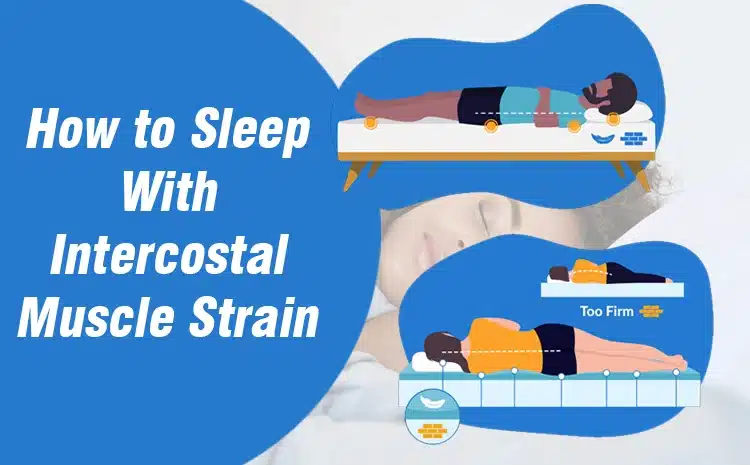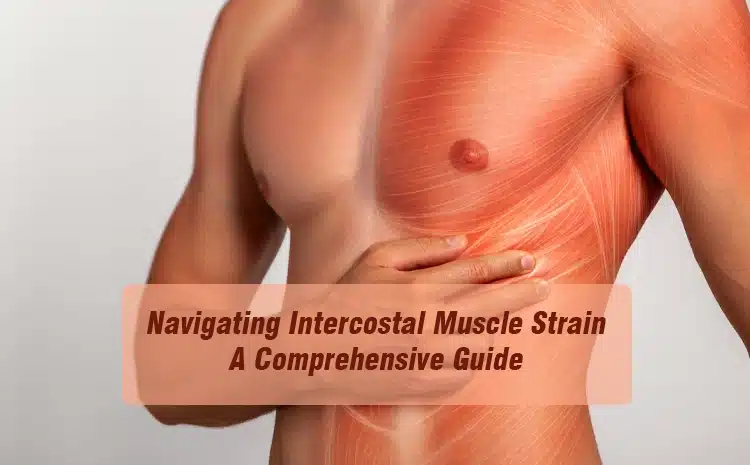Are you looking for a comprehensive guide on Intercostal Muscle Strain? Welcome to the solution of your concerns. The intercostal muscles are made up of numerous layers that cling to the ribs and help the creation of the chest wall as well as breathing. An Intercostal Muscle Strain occurs when an intercostal muscle tears due to severe twisting, straining, or stretching.
This article examines the symptoms of an Intercostal Muscle Strain and explains how they differ from other upper-body ailments and pains. We also investigate the causes and therapies for these strains. In our latest blog post, we look at the symptoms, treatments, and diagnosis of this prevalent yet sometimes ignored illness.
Don’t let intercostal muscle pain limit your activities; instead, arm yourself with the knowledge you need to get relief and heal quickly. Continue reading to learn important ideas that could be the secret to relieving your suffering and recovering your health.
Intercostal Muscle Strain: What It is?

Intercostal Muscle Strain is a type of injury that occurs between neighboring ribs. The intercostal muscles are divided into three layers: exterior, internal, and deepest. The deepest intercostal muscles compress the ribs to support and stabilize the ribcage.
The internal intercostal muscles run from the posterior to the anterior rib cage and are located above the innermost intercostal muscles. They help to stabilize the rib cage during physical activity and depress the ribs during expiration. The external intercostal muscles are the final group of intercostal muscles, extending from the anterior to the posterior rib cage. They raise the ribs during breathing and govern their movement.
During an Intercostal Muscle Strain, any layer of the intercostal muscles may be overextended, pulled, or partially ripped, resulting in pain and breathing difficulty. Although there are treatments available to alleviate discomfort and inflammation, intercostal muscle sprain is a medical condition that heals on its own.
Intercostal Muscle Strain vs. Other Upper Body Pains
The upper back is frequently stationary, so injuries to it are uncommon. If you are experiencing discomfort in this area, it is most likely due to poor posture over time. It could also be the result of a catastrophic injury, such as a car accident, that has damaged the stability of the upper spine.
Upper back injuries usually cause people to experience a single, severe spot of pain. The ache may come and go, spreading to the neck, shoulder, or other upper body areas. Intercostal Muscle Strain is almost always caused by an occurrence, such as an injury or excessive exercise. When suffering from pneumonia or other lung disorders, it may be difficult to determine the underlying cause of pain.
If you can specify the exact position of the pain, such as between your ribs, it indicates that the upper back or lungs are not the source of the problem. Sharp, outward-moving lung pain is a typical description. Rib fractures often cause significantly more pain than intercostal Muscle Strain.
The following symptoms may indicate a rib fracture
- Feeling breathless
- Protrusion or sharp stabbing sensation in the rib area
- A very delicate area around the ribcage
- A cracked rib is a medical emergency that requires quick treatment
Intercostal Muscle Strain VS Pneumonia
Because both pneumonia and Intercostal Muscle Strain cause chest pain, it can be difficult to tell the difference. However, there are several warning signs:
The following are other indicators of an Intercostal Muscle Strain:
- Discomfort when sneezing, coughing, or breathing
- Discomfort while using the affected muscles
- Swelling in the vicinity
- Muscular pain and tightness
Who’s Most At Risk For Muscle Strains In The Chest?
One of the most common causes of musculoskeletal chest pain is tension in the intercostal muscles. However, sedentary behavior or advanced age may enhance your risk. An elderly person with thinner muscles may strain their ribs more easily than someone who exercises and has developed their muscles.
Intercostal Muscle Strain Symptoms
The signs and symptoms of an Intercostal Muscle Strain may differ slightly depending on the underlying cause. However, symptoms are limited to this region and typically involve respiration, as the intercoastal muscles are positioned in the body’s trunk and are required for breathing.
Some of the symptoms could be:
- Acute rib and upper back pain
- Intense and unexpected agony, particularly if caused by a strike to the back or chest
- Discomfort between your ribs
- Soreness that gradually worsens after performing physical exercises like swimming, rowing, or other repeated movements
- Increasing discomfort when inhaling deeply, sneezing, or coughing
- Muscles stiffen and tight, causing upper back pain
- Intercostal muscle spasms
- Muscle stiffness when the upper body bends or twists
Common Causes of Intercostal Muscle Strain

Intercostal Muscle Strain is not usually caused by normal exercise. These strains are most commonly caused by muscle injury or overuse.
Typical reasons include:
- Extended overhead
- A direct strike to the rib cage from a car accident or fall
- For example, while painting a ceiling, reach up
- Impact struck from a contact sport, such as football or hockey
- Unusual torso bending
- Strong, repetitive motions, such as hitting a tennis ball
- Twisting when using a weightlifting machine
- Powerful twisting, as in tennis or golf
- Twisting from certain dance or yoga positions
- Raising any substantial item above shoulder level
Intercostal Muscle Strain can also be caused by an abrupt increase in physical activity. This is especially true in circumstances when a lack of activity or poor posture might result in muscle weakening.
Diagnosis Intercostal Muscle Strain
A physical examination is required to determine Intercostal Muscle Strain. The goal is to assess sensitive areas and search for potential movement restrictions. A pulmonary exam, for example, can help diagnose problems with the body’s trunk. The doctor will also question about any recent sporting activities or injuries.
A medical professional may request imaging tests such as an MRI or an ultrasound. This can help to rule out other wounds, such as rib fractures.
Intercostal Muscle Strain Treatment
If the damage from an Intercostal Muscle Strain is minor and the symptoms are not severe, home treatment may suffice. Here are some examples of home therapy options:
- Apply a cold or ice pack first, followed by heat therapy. Warm baths, heating pads, and sticky heat wraps are examples of heat therapy techniques.
- If breathing is painful, lay a pillow against the afflicted muscle and splint it. On the other hand, respiratory issues demand rapid medical attention.
- Taking a few days off from all physical activity and resting will allow the strained muscles to recuperate.
- Using pain relievers to alleviate discomfort and edema. Acetaminophen and ibuprofen are two OTC medications that may help with intercostal muscular tension.
Aside from the above-mentioned home remedies, the physician may prescribe the following:
- Muscle relaxants to relieve acute pain and spasms
- Physical Therapy (PT)
- If other treatments do not work, an injection of lidocaine and corticosteroids can relieve pain and swelling
How to Sleep With Intercostal Muscle Strain

It can be difficult to fall or stay asleep. Managing your discomfort is essential to better sleep and healing from an Intercostal Muscle Strain. You can utilize a variety of tactics to ease symptoms and get the rest you need.
Avoid External Pressure And Keep Your Torso Neutral
If Intercostal Muscle Strain pain is keeping you awake, consider changing your sleeping position. To avoid unintended twisting or putting additional weight on the injury, the best sleeping position keeps the spine in its natural alignment and the body in a neutral position. If you sleep on your side, you may discover that sleeping on the uninjured side is more comfortable. To support your head, neck, and upper body, select a soft and supportive mattress.
Keeping your upper body up may be beneficial, particularly in the beginning. Use cushions to prop yourself up, or if you have one, an adjustable base.
Pain-Reducing Meditation Exercises
According to preliminary research, practicing mindfulness meditation may help alleviate discomfort and promote physical relaxation during Intercostal Muscle Strain. Although there are different types of meditation, they frequently include the following elements:
- Assuming a comfortable sitting position
- Meditating in a tranquil environment
- Concentrating on breathing, something, or a few words
- Maintaining an open mind and allowing distractions to pass without passing judgment
Stretching And Breathing Exercises For a Gentle Workout
Stretching and breathing exercises can help speed up healing and ensure that the pain from your injury does not interfere with your ability to breathe.
Incorporating these exercises into your evening routine may also be useful, as research shows that deep breathing can help relieve stress and pain. Move cautiously, and if the discomfort worsens, consult your doctor.
Maintain Good Sleep Hygiene

Establishing healthy practices helps pave the path for peaceful sleep. Among the elements of good sleep hygiene are:
- Maintaining a Regular Sleep Schedule: Going to bed and waking up at the same time every day, even on weekends, promotes sound sleep.
- Establishing a Bedtime Routine: Before going to bed, you can unwind by reading, meditating, or taking a warm bath.
- Creating a Cosy Sleeping Ambience: You want a bedroom that is calm, cool, and dark. Make the environment more sleep-friendly by utilizing sleep aids such as earplugs or an eye mask, as needed. To prevent light from entering the room, use blackout curtains or a white noise machine to filter out background noise.
- Restricting Your Bed Use to Sex and Sleep: If you’re having difficulties falling asleep, avoid lying in bed for more than 20 minutes at a time. This will help your brain form a relationship between your bed and sleep. Instead, engage in a relaxing activity in another room and then return to bed when you’re exhausted.
- If you continue to have difficulties falling or staying asleep, see your doctor. They can help you determine whether an underlying sleep disorder is interfering with your ability to get a full night’s rest.
Talk to Your Doctor
You should inform your healthcare practitioner about your pain threshold and sleep concerns so that they can develop a treatment plan that is appropriate for you. Tell your doctor about the treatments you are currently using or have tried, including heat therapy and over-the-counter pain relievers.
In more severe cases, your healthcare practitioner may inject lidocaine or corticosteroids into the affected area if the muscles continue to be harmed. These injections can alleviate discomfort.
When to go to the ER for Intercostal Muscle Strain?
Intercostal Muscle Strain can be difficult to detect due to various causes of chest pain. If your chest pain lasts more than three days, schedule an appointment with a healthcare specialist to get a diagnosis.
Other types of chest pain can be highly serious, but Intercostal Muscle Strain is usually not. Assume you have suffered a fall or direct damage to your chest. In that case, you should see a doctor to ensure that no bones are damaged or misplaced. Visit a healthcare specialist to rule out other conditions and establish that your chest pain is caused by a muscle strain.
If your intercostal muscles feel strained, you should probably go to the emergency room. Are you in Fort Worth looking for an emergency room facility? The only place to look is in the ER of Watauga. We are a 24-hour emergency room that treats Intercostal Muscle Strain with care and urgency.
Conclusion
It is critical to identify the signs and symptoms of Intercostal Muscle Strain to make an accurate diagnosis and manage this sometimes overlooked ailment. Intercostal Muscle Strain can cause localized soreness, tenderness, and pain in the chest or ribcage area, which is sometimes exacerbated by certain motions, deep inhalation, or even a rapid sneeze. To ensure proper treatment, these symptoms must be distinguished from more serious medical conditions, such as cardiac illnesses. At ER of Watauga, we offer the best healthcare service in Fort Worth and nearby areas. You can contact us today to book an appointment.
FAQs
What are the causes of intercostal muscle strain?
Intercostal Muscle Strain is commonly caused by rapid twisting or overexertion during activities such as sports or heavy lifting. Poor posture and repetitive actions can both contribute.
How is intercostal muscle tension diagnosed?
A healthcare expert will often do a physical examination of the affected area to make the diagnosis. Imaging studies such as X-rays or MRI may be recommended to rule out other possible reasons.
What are the most prevalent signs of intercostal muscle strain?
Symptoms include ribcage pain, discomfort when breathing or moving, and muscle spasms. In severe circumstances, people may struggle with deep breathing.
What is the best treatment for intercostal muscle strain?
Rest, ice, and over-the-counter pain medications are recommended as first-line treatments. Gentle stretching exercises and physical therapy can help you heal. Severe cases may necessitate medical treatment and prescription drugs.
How long does it take to recover from an intercostal muscle strain?
Recovery times vary, but most people see improvement within a few weeks of receiving good care. To achieve the best outcomes, avoid activities that could worsen the strain during the healing process.






